|
Short Fiction ~ Sangeetha G First Prize, Strands International Flash Fiction Competition - 18 She met him at the age of 17. His moustache had just started to sprout. His facial features were not yet defined. They talked about their passion to see the world, meeting new people, learning their stories, and treasuring their memories, knowing that they would never meet those people again. At the age of 25, they met again. His face had developed a mature charm that was inescapable. “I am going to fly,” she was excited. “I knew you were a bird. The first time I saw you, your hair glowed like bronze-coloured feathers and your skin gleamed bright when the evening sun bid you goodbye. You were wearing a light blue top which had wide sleeves. The sleeves hung from your shoulders over your hands like two flappy wings. Your skirt was wide enough to help you take off. You wore black shoes which covered just your toes. Toes, which are like roots that hold onto the ground, were missing. I thought you would fly any moment,” he said. “Are you coming with me? We will fly over unknown lands and rivers, mountains and plains,” she persuaded him. “I can’t cover my toes like you. They are pulling me to the ground. I have to take care of my mother. She needs a wheelchair and two hands to push it around,” he sounded low. “But the 17-year-old girl will always remain in my mind and I will keep waiting for her to alight someday,” he said. They met again when they were 30. He introduced his wife to her. She felt alienated. But when she looked into his eyes, she could see the 17-year-old girl wanting to fly. “I am sorry. Life is taking its course. I am flowing with it. I am not a bird to fly against the wind,” he sounded apologetic. “You need not be. I know you have toes,” she said. She told stories about the green villages by the hills where children kept looking at her with awe and curiosity as she struck conversations with the elders, about icy mountains she scaled and the nights when she almost froze to death under sheets of snow. “But I had to come back to tell these stories. That kept me warm and alive,” she said. “Don’t you feel the need for a nest?” he asked her. “A nest can wait. I have long flights to make,” she said. The next time they met after a decade, his hairline had receded and the sharp jawline was buried under a layer of fat. He happily introduced his children. He spoke about them excitedly. He had a large collection of stories to share. She heard all those stories about his children and shared his joy. She told him about the deserts she crossed, beautiful women who had imprisoned themselves in black robes, and the large sand castles they stayed in. She also narrated how she got lost in vast dunes - parched, famished, and exhausted. He heard her with eyes wide open. She could still see the 17-year-old girl there. She came back at the age of 56. Most of the facial features that defined him at one point of time had disappeared. He had lost his wife and his children had found their ways. “Can’t you come with me now?” she asked. “I have to take care of my little grandson. How can I leave him?” he asked. “I know you can’t hide your toes,” she said. “Aren’t you tired?” He was curious. “Not yet. I am still a 17-year-old girl,” she smiled. Almost a decade later when she returned, she had to search for him. She found him in a large home, but his world had shrunk to a bed in the corner of a room, which he shared with several others who looked equally weary, weak, and emotionless. She held his frail hands and looked into his eyes. The 17-year-old girl was missing in those eyes. “Who are you?” he asked. With a shudder, she realised that she had lost the 17-year-old girl forever. She died in his memory. She felt tired, her limbs turned powerless and her skin became loose and saggy. She had no energy left to fly. “I am searching for a nest to rest. Will you come with me?” she asked him. He kept on staring at her, searching for traces of her memories in his empty mind. She made him sit in a wheelchair and steered it out of the large home. ~  Sangeetha G is a journalist in India. Her flash fiction and short stories have appeared in Down in the Dirt, Academy of the Heart and Mind, Kitaab International, Indian Review, Storizen, The Story Cabinet and Borderless Journal. Her story won Himalayan Writing Retreat Flash Fiction contest 2022. Her debut novel is in the works.
0 Comments
Short Fiction ~ Sam Szanto Second Prize, Strands International Flash Fiction Competition - 18 Rachael Sparks was the best runner at her school. She considered this was because she was the tallest, with the longest legs. On Sports Day, she won all of her races. Her PE teacher asked if she wanted to join the Athletics Club. When she said not really, thank you, he emailed her parents to ask the same question. Please give some thought to this. In my opinion, Rachael would bring a lot to the team. ‘Why wouldn’t you join?’ her mum asked. ‘Running’s your talent, Rachael. Your gift. You could be the next Paula Radcliffe.’ ‘Your grandad would have loved seeing you win those races,’ her dad said. Rachael’s grandad had died before she was born; there was a framed picture, in the toilet, of him post-London Marathon, face scraped of feeling despite the medal he was holding up. Her dad often reminisced about the cross-country runs they had done together when he was a boy. He would like Rachael to go running with him now. Her dad thought of himself as a runner. Rachael thought of herself as someone who won races. Running was fine, but she liked finishing a race more than taking part. The thrill was in streaking past the line and lifting her head, the stretch of sky flung backwards, the sound of her breath going back and forth. While she was running, words pulsed in her brain and flowed alongside her. The words listened to her body. In normal life, Rachael found it hard to be listened to. Rachael couldn’t make her parents see that she didn’t care about being part of a team, people shoved together on a coach at weekends just because they were good at one thing. None of Rachael’s friends did Athletics. If she had to join something, she would choose Library Club. ‘How about you come to the next Park Run?’ her dad asked. ‘There’s a Junior 5K on Saturday, I’ll sign you up. If it’s not for you, we won’t mention Athletics again.’ ‘I’d rather not,’ Rachael said. ‘How lovely for you two to have some bonding time,’ her mum said. * Rachael’s dad, head to toe in Lycra, opened her curtains at seven o’clock on Saturday. The sky had been coloured in with grey pencil. Rachael, slowly sloughing on her school PR kit, hoped it would rain so the race would be cancelled: she could finish Harry Potter and the Deathly Hallows. Fingers of rain tapped on the car windows. ‘Great to run in a shower,’ her dad said. ‘It helps your speed.’ There were three car parks in Bushy Park, where the race was taking place, but only space in the one furthest from the start. Rachael’s dad said that as the junior run started before the adult one, he would drop her off then park the car. Rain hammering on her head, Rachael hurried to the group of runners. ‘Race is about to start,’ a woman with a face full of wrinkles called. ‘Name?’ Rachael told her, and the woman consulted a list. ‘I can’t see you. We’ll sort it at the end. Find a space: thirty seconds.’ Rachael squeezed into the front middle of the runners; there was nowhere else. Looking around, she felt a beat of nerves. The others had on proper running gear; the type of leggings and tops her dad wore. They had long skinny legs like her, but most were even taller. They looked a lot older, too. Was this really a Junior 5K? A whistle blew, the runners streamed forward. Not knowing what else to do, Rachael ran. The wind and rain rushed behind her. Strangers stood at the sides: cheering, waving. She felt free, like an animal. By the time she reached a split in the course, Rachael’s breath was catching at the back of her throat. She inhaled a midge and choked. Her body was tiring, her muscles sore. Each breath was followed by an ellipsis. ‘Bit young for this, aren’t you?’ A man threw out a grin as he passed her. Rachael’s temper flared. She might be young, and not a real runner, but she had never lost a race. Breaths burning, she sprinted. Level with the front of the pack, she slowed slightly so as not to use all her energy. The end was in sight. And for the first time, she felt inside the run. One… final… spurt… There was a single person in front of her, the man who had said she was too young for this. Rachael took in lungfuls of air, pushed on. The path shouted at her feet. Then she overtook the man and joy surpassed pain. Her feet skidded over the muddy finish line. A shimmering silence; then came the applause. ‘Rachael!’ Her dad was striding over, looking like someone who had found a new room in a house they thought they knew. ‘You won, Rachael. You won an adult race.’ As the wrinkled woman put a gold medal around Rachael’s neck, she asked: ‘How old are you, love? Fourteen?’ ‘I’m ten.’ Rachael tried to catch her breath. Sparks of pain flared inside her thighs. She was given a bottle of water, and gulped it down. ‘Can I keep the medal?’ ‘Sorry, Lindsey,’ Rachael’s dad said to the woman. ‘I mixed up the races; thought the Junior 5K was first.’ The man who had come second smiled at Rachael. ‘You must be the shining light of your school’s athletics club?’ He turned away to high-five another competitor before she could reply. ~  Sam Szanto lives in Durham, UK. Her short story collection ‘If No One Speaks’ was published by Alien Buddha Press in 2022 and her collaborative poetry pamphlet, ‘Splashing Pink’, by Hedgehog Press in 2023. Over 90 of her stories and poems have been published/ listed in competitions. She has won first prize in the First Writer International Poetry Prize, the Shooter Flash Fiction Prize, the Charroux Poetry Prize and the Mum Life Stories Prize. She is an editor for the Afterpast Review. Twitter sam_szanto Instagram samszantowriter website: samszanto.com Short Fiction ~ Aneeta Sundararaj Third Prize, Strands International Flash Fiction Competition - 18 In the opinion of Dr. Andrew Mohanraj, adviser and consultant psychiatrist at Happy Therapy, [animal-assisted therapy], “will further contribute towards improving the motivation of patients and indeed inspire those who require therapy via the bond that will be formed between the dog and the client, be it a special child or an adult.” Professor Dato’ Dr. Andrew Mohanraj It is with a heavy heart that I announce the passing of Laddoo, our obsessively possessive dachshund. She lies in what my father once referred to, rather ungraciously I may add, as ‘the dog cemetery’. In other words, Laddoo was buried in our garden. Named after an Indian sweetmeat, Laddoo was the shortest living of our family’s numerous, neurotic, nomadic, four-legged babies. The average life span of our cohort was approximately twelve years. Ladddo was seven. The notable exception was, of course, Gorby, who survived no more than a day after being dragged in from the cold by the cat. Within the week, he was joined by Lenin and Stalin, also dragged in more dead than alive by the cat. The lawyer in the family, I defended our half blind Pinocchio by stating that, at seventeen, the cat must have lost her sense of smell; she mistook these severely and terminally ill puppies for rats. Hmmm… My wife, Anjana, together with our sons, Adi and Akash, were predictably horrified. Nonetheless, we decided never to reprimanded the poor old dame for complimenting us with the prey she caught. Another standout was Mandela, the giant of a Great Dane. He was so named because of the extremely long walks on which Adi had to take the dog to expend its energies. This imposed exercise helped our son, who was on the autism spectrum, come out of his shell, lose weight and socialise with others. Tears fill my eyes at the mere memory of the inviolable bond formed between them. The most peculiar thing about this dog was that of all the things he was scared of, it was geckos. He would not enter a room if he sensed the presence of even one of these reptiles a thousand sizes smaller than him. It’s quite something to see a Great Dane quivering having climbed onto the sofa to avoid a gecko, much like Anjana when there was cockroach in the house. With such politically-inclined names our sons gave to all our dogs, it made sense, I suppose, that one was a career diplomat and the other, an aide to an MP. I sort-of bonded with Mandela. You see, ten years after Mandela’s death (he was also seven), I still have what can only be described as a dent in my foot. It’s where Mandela placed his paw while I drafted legalese in the study. Oh, I do miss Mandela’s meaning of ‘keeping in touch’. “Now that your children have gone to university, why don’t you get a smaller dog?” A thought planted in our heads by the vet, no less. “A dachshund is good. Small, family friendly. And,” he wagged his forefinger, “it’s not a dog that sheds.” All of it was true, of course. But no one warned us that a dachshund had to be walked every single day. Granted, Anjana and I lost 10kg between us within three months of this bundle of sunshine entering our lives. Honestly, though, if we skipped ‘walkies’ for a mere three days, the deterioration in Laddoo’s mental health was palpable. The whining. The pacing. The sad eyes. They were incessant. Laddoo was, by far, the most privileged of our dogs. She had a stainless-steel bowl (others had plastic ones) and a custom-made bed to suit her extra-long body. For parties, she dressed up in a collar decorated with Swarovski crystals. When she was diagnosed with congestive heart failure, she was referred to a vet in Brickfields who specialised in cardiac matters. It was too late, though, for Laddoo was already in terminal stages of the disease. I did wonder though, what would the treatment have entailed? An open bypass surgery? A cardiac stent? Would she have to be on beta blockers? Being the glutton that she was, I wouldn’t have been surprised if the vet had said that she had hyperlipidaemia. The routine after Laddoo’s demise was bound to be the same morose one. A square plot (rectangular in the case of Mandela and Laddoo) would be picked out within the hour of death. If death had occurred during the day, the funeral was over by nightfall. Likewise, if death occurred at night, by eight in the morning, the dog would be resting in peace. I dug the graves as my sons – the snowflakes – found it back-breaking work. Anjana cried uncontrollably during the solemn moments when I – again, not the snowflakes – carried the dead dogs to their final resting place. I doubt anyone realised that the graves were becoming shallower. Surely the six-foot under rule applied only to humans, no? I did have a recurring nightmare, though. On a dark and stormy night, I was in the middle of my garden with the carcasses of dead dogs floating all around me. I have yet to break this sad news about Laddoo to the snowflakes. One’s in Turkmenistan and the other is busy campaigning for his own seat in Sungai Kolok. My back aches too much to type a personalised, comforting and fatherly WhatsApp message to them. This bulletin will have to do. Rest thee well, sweet Laddoo. ~ Reference: Parvan, L. 17 August 2017. Malaysia: Animal assisted therapy stands up for physical and emotional support of patients. Bodyreviewers.com Retrieved in March 2023 from https://www.bodyreviewers.com/malaysia-animal-assisted-therapy-stands-physical-emotional-support-patients/ 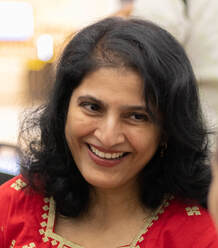 Aneeta Sundararaj is an award-winning writer. She trained and practised as a lawyer before deciding to pursue her dream of writing. Her writing has appeared in many magazines, ezines and journals and, to date, she’s worked on some 13 book projects. Aneeta has contributed more than 250 feature articles to a national newspaper. Her most recent and bestselling novel, The Age of Smiling Secrets was shortlisted for the Anugerah Buku 2020 organised by the National Library of Malaysia. In the past, stories about the real-life Ladoo, Aneeta’s much-loved dachshund, were compiled into a collection called ‘Ladoo Dog: Tales of a Sweet Dachshund’. Throughout, Aneeta continued to pursue her academic interests and, in 2021, successfully completed a doctoral thesis entitled ‘Management of Prosperity Among Artistes in Malaysia’. Short Fiction ~ Denise Eaton Honourable Mention, Strands International Flash Fiction Competition - 18 Ship’s captain, he’d been. Dapper, upright, commanding. Now, on this brightly-lit ward, little more than a cadaver remained, skin a waxy blue, morgue-ready. ‘Hearing’s the last to go,’ the nurse had said. ‘You should keep talking.’ What about? Simon had wanted to ask. Destroyers? Mainsails? The bloody shipping forecast? If conversation was painful while his father was hale and hearty, ‘a spot of cancer’ wasn’t going to open the floodgates. But ‘I will,’ he’d said dutifully, and watched as she smiled and turned her attention elsewhere. It was visiting time again, and twice a day the tide of wearied loved ones washed up around each bed, proffering flotsam and jetsam from the foyer shop. News from the outside world was delivered with unnecessary pomp, and questions were asked - about the food, about what the patient had watched on television, about how they were feeling that day. Simon often listened in, hoping for snippets he might use himself, some hint of a normal relationship. He thought of his own little boy and hoped that when this time came for them, the conversation might at least flow. ‘My turn for Davy Jones’s locker,’ his father had said when the diagnosis was delivered, and Simon had found himself explaining the euphemism to a bemused young registrar. Six months, apparently, with a fair wind behind him. And now at that very edge, Simon wanted to shake his father and shout, why could you never talk to me? He looked around the ward for courage, at the hugging and hand-holding, the soft whispered words, looks of tenderness and loss. He took a deep breath. And then, on cue, his phone pinged in rescue. In the café, the message said. Later, sitting by the window with his family, he turned his head to hide the salty tears and stared out at the horizon. ‘Daddy sad,’ his little boy said, brow furrowed. ‘Why?’ ‘Because my daddy is very ill, and I can’t tell him I’m going to miss him.’ And all at sea he felt lost like never before. ~  Denise Eaton came to writing late in life, enrolling on Sheffield Hallam University’s Creative Writing MA in her 60s. Working with local actors from I’ll Have What She’s Having, she helped create ‘the show with a big heart.’ Their productions, featuring Denise’s scripts and poetry, have been staged in various cities across the North of England including the Buxton Fringe Festival. She was selected to take part in the Sky Writes initiative - a partnership between Sky Studios and New Writing North - and created a comedy drama pilot for TV. Through a mixture of monologue, script and short fiction, Denise’s work explores the effect we have on one another. Short Fiction ~ Katie Holloway Honourable Mention, Strands International Flash Fiction Competition - 18 Celia, who some called scrawny, but was really hungry-skinny, was lying on the pavement. Empty, head floating like a lost balloon, she’d fallen on her way home from school. Her 14-year-old body had flailed to the ground, scraping a bony elbow and bruising a jutting hip. There wasn’t enough of her to ground herself, to do the sway and rebalance she’d seen others accomplish. The pain stung, but not as much as the strangers walking straight past her had. Limping home, Celia let herself in and called up the stairs, knowing she’d get no reply. The kitchen was empty of ice packs and sympathy, so she’d cleaned herself up, then hobbled to Mam’s room, where the telly was on and Mam stared at it, eyes like blown light bulbs. Celia leaned over the knee-high stack of magazines by the bed and placed a kiss on the side of Mam’s head. Brushing the place with the back of her hand, Mam said, ‘Home then?’ Celia nodded, knowing that Mam wouldn’t see without turning her head. She crept away. Celia concocted a plan. Loitering in the lunch hall, she began snaffling leftovers, gorging on sandwich crusts and rice scrapings ‘til she felt the yawn and stretch of her stomach, waking up at last. For the first time, she savoured fullness: steady as daily bread. She took on a paper round, spending her earnings on sandwiches and cakes and pastries and then - rejoice! - second hand clothes in bigger and bigger sizes. Celia sank her teeth into the sugared mound of a doughnut; pierced the layers of a vanilla slice, licking shiny spilled custard from her fingers; and gloried in the intense density of a glossy chocolate fudge cake as she devoured wedge after wedge. Beginning to take up more space, it required increasing effort to shift her substance up the hill to school. She relished the oniony sweat she gave off, glad to be tangible in the atmosphere. Found a thrill run down her spine when the day’s slice of gossip featured her name. Now Celia couldn’t slip by unseen. As she grew, she became so much more. She began to attract stares. It took longer for Mam to notice. But one day, when Celia lifted a pile of Argos catalogues off her Mam’s bed and hefted herself onto the end, in front of the telly, Mam paused on the precipice of telling her to move. Mam’s eyes opened wide as she looked at all of Celia at once, and Celia felt her whole insides fill up. ~  Katie Holloway writes tiny stories in the south of England. She is often tempted to uproot her family to go and live in a tree. Katie has received a DYCP grant from the Arts Council England, a nomination for the Pushcart prize, and the first prize in the 2023 Retreat West prize (flash fiction category). Her stories have been published in Popshot Quarterly, Ellipsis Zine, Reflex Press and more. Katie tweets @KatieLHWrites Short Fiction ~ Leanne Drain Honourable Mention, Strands International Flash Fiction Competition - 18 The hills are alive, the trees speak from the heavenly light, and the dinosaurs eat meat from the top of the valleys for yards. There is a happy place across the glossy river. There is a home beyond the treasured place. A place of magic, a place of life, a place where all is well with the world. And brings in harmonious peace. The castle of DeLaria is a place fit for a queen. Idris rules her reign and marries a man called Ewart. He is the king of DeLaria they have a beautiful daughter called Marianne who is born into the world with her lovable smile and blue placid eyes; however, Mariann is different because her hands are born with an extra finger, a family defect, the doctors would say. But it worried her mother, Idris, and she grew concerned for her beautiful daughter's future. Ewart swore he would find a cure, so he began his quest late one night. He travelled to Gallas, the other side of the north winds river. He would there find Empress Eline. She would bring him the antidote he needed to heal his daughter, but it came at a price, for Eline was a dark empress who wanted revenge on her beloved sister Idris. However, Idris never told her husband about the Eline empress, her sister; instead, she just said she was an only child. Ewart was walking into a trap, a master plan he knew nothing about, until he met Eline in the river, where she washed away her pain of the past. "Eline Empress of the north winds of Gallas, I beg you to save me and my wife Idris's daughter". Ewart spoke directly to Eline. Eline shuffled with pain at Idris's name- Eline said do you know very well that your wife, my sister, betrayed me- that's not possible. My wife has no siblings; she is an only child. Idris is clever. She must have wiped your memories You were always the best at memory charms, but I was the best at regaining the memory. As soon as Eline said these words, she engulfed a memory charm upon Ewart. No, that can't be true, but the memory charm never lied – she deceived you, broke you, took you for granted, and yet you still love her. Idris, why spat Ewart, and somehow the communication they once shared broke into a thousand glass pieces. Ewart, you are now mine, Eline said as he obeyed every command. He was bewitched by her beauty and, under the spell, fell head over heels in love with Eline- Back in the castle of DeLaria, Idris feels darkness spreading over the hills through the valley and then collapses while Mariann grows into a blossoming young woman. Somehow, the curse had fast-forwarded her life. Her memories were now gone, and it was left to Marianne to try and break the curse. Eline grew with power – destroying the world of DeLaria; she came swarming through the antennae of the castle and then found Idris lying on the cold floor. Well, what do we have here Eline spat out at the woman plastered on the floor. Idris, my dear sister, not so glorious now, are we -- Ewart, come here, Eline spat nastily at her wicked plan. Ewart kills Idris. As Eline watched Ewart strike out his emerald sword, she laughed wickedly. No one can save you now. Want a bet? Shouted Mariann – as Mariann came back into the room with her extra Finger in tow And who might you be I am Marianne, daughter of Idris and Ewart Not possible you're a baby – said Eline No, dear aunt, I am the past, present and future of DeLaria, and I know that Idris hurt you. She stole from you a ruby ring with Eline and Idris's names against it- where did you get that from Mum's room? She kept it locked away, but I know Mum, and Mum knows me. She knew I would need it one day. That belongs to me, tears in Eline's eyes. No, it belongs to no one. It now belongs to me. Marianne stuck it on her extra Finger. As soon as it touched the Finger, the Finger fell off, and DeLaria was free- the ring broke into a thousand pieces, and Eline was destroyed by the flames of the ring's power while Idris regained consciousness and Ewart was free from Eline's curse. Both parents held each other, and then they faced their beloved daughter. Your Finger saved us, dear Daughter. You are a true queen of DeLaria, but Mum, you're forgetting something. I need to be a baby again, this time just like me, with no extra finger and then you can watch me grow up Yes, my dear, you are right, and with one final look, Idris took her daughter's hand, and she became a baby again, this time with no extra surprises. Idris and Ewart smiled as they watched their beautiful Marianne become the beauty she would always become. ~  Leanne Drain is a writer based in the UK. She enjoys creative writing and is currently studying creative and professional writing at The University of East London. Her dream is to become an established novelist. Short Fiction ~ Michael Pettifer Honourable Mention, Strands International Flash Fiction Competition - 18 I made my way to a vantage point where I could see the river meander and morph into white water - Crystal Rapid. From this position the water was running fast with curlers and holes challenging those that dare. And the noise. The rumble of the rapid... a drum roll. At distance the rafting looked challenging but not too dissimilar to the rapids I had trained for. I made my way from the vantage point to our launch point joining Chris at our raft. Just the two of us manning the smallest raft. We checked the lashings making good any slack. We donned life jackets. We felt confident. ... We stood by our raft in silence. We knew the challenges – holes and curlers. He went to the back of the raft and I to the front. We pushed our raft on to the river taking our pre-planned positions. My job, in the prow, is to lean forward, keeping a straight body line and go headfirst through the rising walls of water-the curlers. That tactic keeps weight at the front of the raft and keeps the boat in balance. Timing is everything. We were mid-stream. The river running faster. I take my place and fix my legs and feet gripping the side rope to give me and the raft maximum stability. I’m not the biggest. or the heaviest, but I am a determined young twenty-year-old woman. In the stern, Chris is working both oars in a circular motion keeping us on track. We're confident of success despite the water temperature of nine Celsius, dressed in T-shirts, shorts, Teva sandals and life jackets. The water, a sandy hue, is becoming muddy in colour as the pace of the river increases. # The thing about rapids is you hear them before you see them. The rumble, the drum beat of water tells us that we are about to enter Crystal Rapid, the first challenge on the river. The rumble becomes a roar ... And the noise is a reminder - and a warning - to respect a powerful river. I'm about to enter a cauldron of holes and walls of water - the ‘curlers.’ Suddenly, the river level drops. the front of our raft dives and crashes into a hole. I position myself, headfirst to dive through the rising curler, that wall of vertical water crowned with white foam. I'm sure I will go through the curler as before. But the river is in no mood to accommodate my previous successes. My head and the front of the raft hit the curler. The front of the raft lifts skyward. I lean further forward but to no effect. The raft moves more ... and more ... to the vertical position. I can’t stop this. My leg and body position become detached from the raft as horizontal becomes vertical and the speed of the water pushes the back of the raft in front of my position. Even as I relive this, I remember that feeling of inevitability. No amount of raft trickery would stop this river having its way. '…I am out of the raft...under the raft...the shock of cold water on my body …my mind has to readjust in the rushing water...is this it? I must...use my hands to get from under the raft...keep my feet forward...breathe when I can between the curlers...use my training. The holes pull me below the water level and then spew me out... breathe in again. I’m pulled under again. Where’s Chris? No idea. I am being thrown up and dragged down in the water...feet forward, breathe again when I hit the surface. The power of the water and the rip currents make any thought of my survival dependant on the will of this river to forgive me - or not...the river’s fury spits me out. Shit. I must keep my feet forward - that's the training - feet forward ... I cannot afford to have no sight of what might be in the water, nor can I risk a head injury (no helmets) ... pulled under ... spewed out ... pulled under ... spewed out with the roar of the rapid in my ears ... is this it? Am I going to make it?' # A thousand thoughts flash through my mind. The adrenalin rush keeps me focussed. I have no thought or idea where Chris is. Then, as soon as the rapid enveloped me, the same released me from its grip. I drift with the flow of the river and the tempest behind me. Fellow rafters' wave and shout. They pull me from the river to the bank. Chris was safe. Nature, luck or destiny was on my side ...our side ... that day. And I survived to tell my story. ~ 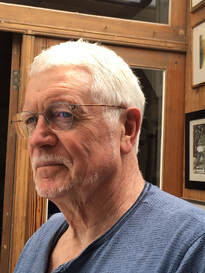 Michael Pettifer has an MA in screenwriting and an Honours degree in Chemistry. He writes flash fiction and short stories and is successful in International flash fiction competitions. Michael was raised near Stratford upon Avon and has a passion for the actors art and live theatre. He enjoys writing short plays for friends. When not writing he is using his word craft as a professionally qualified development specialist advising and supporting others reliant on written documentation and effective communication skills to further their career opportunities. Short Fiction ~ Sharon Boyle First Prize, Strands International Flash Fiction Competition - 17 I am a shirker: a jacker-in of university, a collector of busy yet boring jobs, an avoider of married bliss – I shunned my wedding day, having resolved the night before that a fuck-and-endure commitment wasn’t for me. Besides, there was a fair chance it would’ve interfered with my promiscuity. I am also a fabricator – a tacker-on of Hollywood happiness. The two are connected. Apparently my lapses and broken promises and sleeping around can be blamed on the fact I witnessed my parents’ death – a dual drowning. Mum and Dad spluttered and hacked and clung to one another while trying to rescue a twelve-year-old me who’d floated far out to sea on a lilo. I was saved by the coastguard. That’s the story I tell. Short and simple. Some listeners think it sweet. Others are appalled by the notion of a girl observing the inauguration of her orphan status. They want explanations. ‘Did they call out to you?’ ‘Did they say they loved you?’ ‘What the hell were they thinking? You could’ve died.’ I am forced to fabricate more. ‘When they realised they couldn’t reach me,’ I say, ‘they hugged one another, kissing and declaring their love, for themselves and for me.’ Sigh. ‘Then they sank. Together.’ At the age of thirty six – still a single fish, still promiscuous – I join a swimming class. It’s time I learn. We all hail from the oceans. That was the start of our story. My ancestors floated, flailed and toiled their way through violent seas to stagger onto virgin beaches on newly-evolved legs so that I could exist. My inability to swim is a big-time insult to them. My legs thrash as I fight the water, armed with a float. And then, I’m not in the chlorine-scented pool but back in the ocean that came with a fortnight’s holiday to Crete. My arms, not legs, drub salt water as I steer my lilo around rocks, to a secluded area, following the sound of familiar shouts. Picture the scene: my parents holding onto one another in a strange, desperate embrace. Dad gasping out gripes while pushing Mum’s head under. ‘You promised,’ gasp, ‘that we’d stay together,’ gasp, ‘for fucking forever.’ If I had been able to swim I would’ve chosen a dependable stroke such as the side-crawl and navigated the moving, moody waters to tear Mum away from Dad and his insistence on kept promises. Cupping her chin, I would’ve struggled back to shore to perform mouth-to-mouth heroics. But I couldn’t swim; I could only wail for Dad to stop. Dad, however, was a steadfast, determined sort, not a sappy giver-upper like me. He waited for Mum’s hands to stop their pummelling, and, with eyes locked onto the horizon, disconnected himself and glided away with long, regular strokes. It’s true I was saved by the coastguard. He, who arrived late to the plot, dragged me onto the sand and revived me when I didn’t want reviving (the only time I’ve been ungrateful for a man’s lips on mine). That’s the full, uncensored story – lots of action and emotion, but a lemon-wince of an ending. And who wants to hear that? One day there might be another ending, of me returning to the ocean, of swimming further out than is sensible, of letting myself sink down and down, watching the water’s colour change from glittering turquoise to subdued navy and finally to silent, blunt black where all our stories started and where my story will start again. ~ 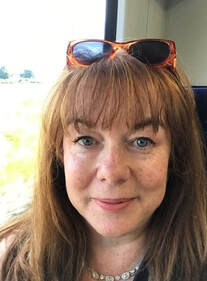 Sharon’s short stories and flash pieces have been published on-line and in magazines including Retreat West, Fictive Dream, Writers’ Forum, Bath Flash Anthology and Ellipsis Zine. She likes eating fried-egg rolls and coorying in bed with a new book. She dislikes driving and the fact that Sharons are becoming an extinct species. She tweets at @SharonBoyle50 and has a blog at boyleblethers.wordpress.com Short Fiction ~ Tim Tomlinson Second Prize, Strands International Flash Fiction Competition - 17 Lou Reed was on line ahead of me at Zabar’s. That might not sound remarkable, but listen: Lou Reed. On line. At Zabar’s. Not the Zabar’s food emporium, but its annex, the little café one door south, corner of 80th and Broadway. That, too, might not seem remarkable, but check the time: 7:55 AM on a weekday, and Lou-walk-on-wild-side-Reed waits on line with a bunch of working stiffs heading off to the office for another day of drudgery? No, Lou-Reed-plus-offices, Lou-Reed-plus-morning, or Lou-Reed-plus-coffee-and-pastry lines: these do not compute. Lou-Reed-plus-bran-muffins equals cognitive dissonance. Cognitive dissonance plus Lou Reed: that computes. The disaffected monotone in the midst of catastrophe so routine it becomes dull. Candy says I’ve come to hate my body—oh, how that computed, especially this morning. I’d had at most three hours of sleep. Unconsciousness might be more precise. At around 2:00 AM I’d gone home, drunk on chartreuse, with The Italian, a visiting film school student with the pinned eyes of a Velvet Underground fan and the harried affect of a user in withdrawal. She had a startling asymmetry to her breasts, the musical equivalent of a key shift: D-major to B-flat. And she had a chihuahua named Rocco after the Alain Delon character in Visconti’s neorealist boxing classic. Rocco took an instant dislike to me—it was mutual—and anytime I moved beneath the sheets, he pounced on the offending body part and sunk his ridiculous little teeth through 1200-thread-count Egyptian cotton. I suggested the fire escape for Rocco, at least long enough for me and The Italian to complete our business. (I envisioned Rocco, in his disquietude, slipping off the landing and dangling by the collar, his toothpick legs kicking their final three-inch spasms.) The Italian said, No, is OK, he fall asleep soon. But The Italian fell asleep sooner and Rocco was so aggressively anti-pleasure that I couldn’t even jerk myself off to dreamland. I don’t know exactly when I passed out, but when I came to it was light and I was due at work in forty-five minutes. I had just enough time to drop a piss in Rocco’s chow bowl and scurry down the five flights to the street where I discovered that my legs, knees to ankles, resembled a game board for Chinese Checkers. At the sight of all those red teeth marks, I experienced such deep sympathy for my skin, which underwent a kind of toxic shock of the stratum corneum. By the time I reached Zabar’s I needed something as cognitively dissonant as Lou Reed on a muffin line to snap me into my day game. And I’d heard all the rumors—he was sardonic, nasty, hostile—but I risked a comment. I said, Lou—Lou Reed? Slowly he turned like, yeah, what? And I said, Right, sorry, nothing. Blankly, Lou Reed stared. I resisted further risk—the hey-Lou-it’s-a-perfect-day kind of thing—but I did register what he ordered: a double macchiato plus blueberry scone. No bag, he told the counter girl when she delivered his coffee. Turning to me he said, And you have a perfect day, then sunk his teeth into the scone. At the register I copied his order, the double-macch-blueberry-scone, which became for me the Lou Reed Special. I reached for my wallet to pay and the counter girl said, No, is OK, Mr. Reed he pay. And wow, that was cognitive dissonance. That was cognitive dissonance squared. I’d heard rumors he’d gone clean and sober, not that he’d gone, I don’t know, Minnesota nice. I followed his crumb trail out to Broadway, where already a used book vendor glowered behind a table. No eating over the books, he said. Oo, I told him, you’re so vicious. That day, my job was apartment-painting for The Editor. The Editor was becoming big—she’d signed a couple of those writers who began publishing in paperback first, no hardcover—you know, the Bright Lights, Big City crowd. It was time for home improvement. She reminded me of Bette Midler, if Bette Midler had no mirth. You’re late, The Editor said. I said, Lou Reed bought my breakfast. I showed her the scone. She said, Maybe he’ll pay for your first hour, too, because I’m not. From a bay window I watched her exit the building. When I was sure she wasn’t coming back, I called The Italian. There was some struggle with the phone before she picked up and muttered a confused hu-hullo. I hung up, and repeated the harassment three more times until she star-69’d and left a tirade of curses on The Editor’s machine, mostly in Italian. I was laughing so hard I almost dumped a paint pan full of “China White” Benjamin Moore on a rug from Uzbekistan. I thought, if Rocco could be crushed beneath a falling safe, this would be such a perfect day. But that’s not what where it ended. It shouldn’t have surprised me that the Editor spoke Italian. When she picked up her messages she star-69’d The Italian and they went at it like a pair of Sicilians until they both broke down laughing about the absurdity of the situation. That evening, over drinks at Teacher’s, The Italian shook hands on a two book deal. Turned out, The Editor was a fool for Italian neorealism and The Italian, she learned, was the daughter of screenwriter Suso Cecchi D’Amico, a founding mother of the movement whose credits included Rocco and His Brothers. The Italian’s childhood, filled with polvere di stelle and trauma, made great melodrama. Her memoir and the novel, a roman à clef, were both optioned by Hollywood studios. She went on to make a fortune, The Editor got her own imprint, and Rocco and his ridiculous little teeth got to feast on a lot more raw human. I got the Lou Reed Special. ~ First Published in Live Encounters  Tim Tomlinson is the author of the chapbook Yolanda: An Oral History in Verse, the poetry collection, Requiem for the Tree Fort I Set on Fire, and the short story collection, This Is Not Happening to You. Recent work appears in Bangalore Literary Review, Live Encounters, Tin Can Literary Review, and the anthology, Best Asian Short Stories 2023. A new collection, Listening to Fish: meditations from the wet world, will appear on Nirala Publications early next year. Tim is the director of New York Writers Workshop, and co-author of its popular text, The Portable MFA in Creative Writing. He teaches writing in NYU’s Global Liberal Studies. Short Fiction ~ Michael Pettifer Third Prize, Strands International Flash Fiction Competition - 17 It was a sunny day in Venice. The elegant venetian cityscape, those fabled buildings, followed the gentle curve of the Grand Canal. A water taxi stopped at Accademia. James alighted from the taxi and headed for the eponymous gallery . Over the years he had been to the gallery several times, the gallery was small, displaying interesting pieces and attracting fewer visitors. He paid his entrance fee and went in. The gallery's monastic ambiance visited a mystic effect on most of that days visitors who, with cloistered whispers, gazed at the large canvasses and sculptures. A group of teenager's collective attention drifted between the enthusiastic and animated gallery guide and their smartphones - time and history touching lightly on their conscience. James took the stairs to the first floor. The canvasses on this floor were smaller but no less impressive. He languidly walked the corridor at the top of the stairs pausing at a small room on his left. Inside this small space hung several paintings. But one image drew him in. The composition, the painting, oil on canvas, was of a woman looking into a mirror. The background to the painting revealed a bathroom , or a changing room, with bottles and paraphernalia required for making one beautiful. The mirror was the viewer. Her fixed wide eyed stare looked directly at him. Her face was drawn and lined and the smoothness of her skin and the clean lines of her chin had gone. He stood looking at the portrait for some minutes. Taking two steps back he took one last look at the woman immortalised in paint. He turned and left. In a cafe nearby he sat drinking a glass of red wine. Swirling the wine in the glass the tell-tale tear drops of liquid clung to the sides of the glass gently returning to the well of red sitting in the bottom. It was a good wine, gentle on the palate. He looked at the back of his hands and with his forefinger pushed against his skin. Ripples of flesh, like small waves rose and slowly vanished as his finger was removed. For a moment he stared at both hands held flat against the table. He left the cafe and returned to his hotel. He walked into the bathroom. There, he stood looking in the mirror. In the silence of his room - looking back at him, he could see what the woman had seen of herself. He and she both knew that their youth and beauty had gone. ~ 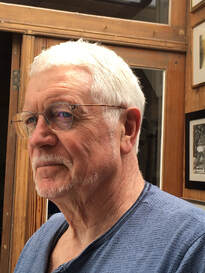 Michael Pettifer has an MA in screenwriting and an Honours degree in Chemistry. He writes flash fiction and short stories and is successful in International flash fiction competitions. Michael was raised near Stratford upon Avon and has a passion for the actors art and live theatre. He enjoys writing short plays for friends. When not writing he is using his word craft as a professionally qualified development specialist advising and supporting others reliant on written documentation and effective communication skills to further their career opportunities. Short Fiction ~ Aneeta Sundararaj Honourable Mention, Strands International Flash Fiction Competition - 17 Two husbands? Before thirty? These were my thoughts every time the waves hit the shore when I couldn’t sleep in my sea-facing studio suite at the Holiday Villa. When I arrived in Cherating two weeks ago, I had it in mind to inform anyone who enquired as to my whereabouts that I was on a photography assignment for the papers. Not a soul bothered. In truth, I was running away from my second husband, the OB/GYN Edwin, and my first, the medico-legal lawyer Vikram. On day sixteen, when the hotel’s capacity was at ninety-eight per cent, a waiter asked if wouldn’t mind sharing my space with another. More statement than question, I nodded in agreement. Man, was Anand chatty! Running his hand through a mop of shoulder-length curls that hadn’t seen a barber’s pair of scissors for months, this medical student shared that he was violently in love. Unfortunately, the young woman’s parents objected to this romance because he was of a different race and religion. He’d retrieved his father’s supplementary Platinum credit card and booked a room at the hotel ‘to think things through’. Since I simply stared at him, he further explained, “People are not nice unless you have a title to your name. I must get that doctor title, no?” He lifted his chin that bit higher. This was teetering on deep – exactly the kind of conversation that I was desperate to avoid. I smiled, called for the bill and retreated to the sanctuary that was my room. Even though Vikram and I had both qualified as law graduates, he loved legal practice and soon stood out for successfully pleading obscure legalese on a regular basis. I lacked a similar mental stamina and pursued a hitherto unsuccessful career as a writer, instead. Shortly after our fifth wedding anniversary, I joined Vikram for a five-day medico-legal conference in Kuala Lumpur. On the second morning, tempted by the breakfast buffet spread of the luxurious Istana Hotel, I was deciding whether or not to abandon my resolve to be vegan when I sensed someone staring at me. Reciprocate I did, but I stared at the man in awe. He said his name was Edwin and asked to join me. I nodded. On the final morning, there was a rushed air about our breakfast. Unsurprisingly, there was a collision of crockery. Since he had to present a lecture pronto, I hurried Edwin into my hotel room to clean up the mess. He pulled my arm, I turned into his chest and in seconds, I committed adultery. You see, this was no affair for that implied that there was a continuity in what we were doing. At least that’s what I told myself. In fact, the very night we returned home, I made sure to fulfil my wifely duties with such vigour that Vikram was astonished. A month later, I received a WhatsApp message from Edwin: ‘When can we meet?’ I didn’t reply. Instead, I confessed everything to Vikram. “Okay, Lola. You go now,” he said. “But we are meant to be.” He kissed my forehead and walked out of the master bedroom of the single storey home we’d built together. I married Edwin out of a sense of propriety three weeks after my divorce from Vikram came through. One year to the day, I checked into the hotel in Cherating. Two months, three weeks and three days later, I received a WhatsApp message with an attached PDF file duly notifying me that Edwin was initiating divorce proceedings on the grounds of that catch all phrase, ‘irreconcilable differences’. It was time to stop existing and start living. I accepted the guilt that came with the knowledge that I’d compromised my own principles. No amount of solitude could erase the fact that I’d let something that should never have happened get so out of hand. I wrote to Vikram and asked him to forgive me. He replied, within the minute to say: I will always love you. We agreed to meet in Kuala Terengganu a week later. A city at the north eastern tip of the peninsula, it was unfamiliar to both of us and, therefore, the perfect way to start all over again. The evening before I left, Anand became both my tour guide and driver. We’d crossed state borders and came to the one-street, seaside town of Chukai. “Think about it,” I said to Anand, “Chukai can be cukai¸ no? The Malay word for tax on traffic that passed through here. It could even have been part of the trans-land trade route between China and India once upon a time.” “Suppose so,” with the same kind of interest that an aged dog shows a gregarious puppy. “Speaking of China,” he said, pivoting the conversation to his favourite topic, “I cannot bear to watch Kylie sleeping, you know. It’s such a solitary act, one which I can never be a part of. For at least one third of our lives, we’ll have to be apart.” I stared straight ahead. In that moment, I felt that the only appropriate response would be to strangle him for his innocence. Sigh! How lucky he was, this Anand. Love was simple to him. Boy meets girl, boy loves girl, boy waits for girl, they marry and live happily ever after. I met boy one, married him, divorced him, met boy two, married boy two, now being divorced by boy two, returning to boy one, and no longer believing in the myth of happily ever after. I turned to look at Anand just as he handed me a crumpled paper and said, “It’s for Kylie, but you can have it.” In neat penmanship, so unlike a doctor-to-be, he’d written: My Love, As the day turns into night, it hits me that we will always be as close as two people can ever be. I think of you with every breath I take. This is a beautiful moment. Your Love. ~ 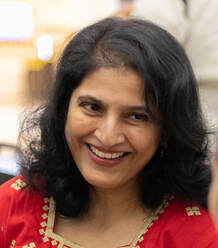 Aneeta Sundararaj is an award-winning writer. She trained and practised as a lawyer before deciding to pursue her dream of writing. Her writing has appeared in many magazines, ezines and journals and, to date, she’s worked on some 13 book projects. Aneeta has contributed more than 250 feature articles to a national newspaper. Her most recent and bestselling novel, The Age of Smiling Secrets was shortlisted for the Anugerah Buku 2020 organised by the National Library of Malaysia. In the past, stories about the real-life Ladoo, Aneeta’s much-loved dachshund, were compiled into a collection called ‘Ladoo Dog: Tales of a Sweet Dachshund’. Throughout, Aneeta continued to pursue her academic interests and, in 2021, successfully completed a doctoral thesis entitled ‘Management of Prosperity Among Artistes in Malaysia’. Short Fiction ~ Brindley Hallam Dennis Honourable Mention, Strands International Flash Fiction Competition - 17 Grandpa Sam was a small thin-faced man with a grudge. He’d served in the First World War, which he always referred to as The Great War. Dad said he’d been in a Bantam Regiment, made up of men who were under-height for the normal army. Dad said that made some of them even better fighters than the full sized men. A lot of farm boys like Grandpa Sam were under sized, poorly fed despite living in the countryside where the food came from. Some say music-hall jokes about gormless yokels come from that time before The Great War, because so many rural labourers suffered from such malnutrition that they couldn’t think straight. When the war came and Grandpa Sam and his mate joined up they got the best food they’d ever had in their lives. In the trenches his best mate would read letters from home for him, and write the ones he sent back. Dad said, your Grandpa could barely read or write before the war. He didn’t need to. He worked with a shovel and spade, not a pen and paper. That was one thing the army did for him, taught him to read and write. A lot of men were subdued, taciturn, silent, when they came back from the war. It was as if something dangerous had lodged inside them like shrapnel, something that if it worked its way out or even moved would be like a bomb going off. Grandpa Sam would tell me tales of his time in the trenches. Well, one time actually. He told me about it over and over again when I was small. Mum could see it upset me. She’d ask, what’s your Grandpa Sam been saying? But I never let on. I always made something up like I’d seen in a comic or a film or read in a book. I’m not sure, when I look back, that she believed me, but I think she preferred to pretend that she did. Mum told him to stop, but when she wasn’t around he’d tell me again. He didn’t tell me hundreds of times; perhaps a dozen or so over the years, but the telling and the story stuck in my mind. It wasn’t a proper story. It didn’t have a beginning and a middle and an end. It was just a little scene that he remembered. That’s how he’d start. I remember one day in the trenches, he’d say, and he’d look at me to make sure I was listening. In The Great War, he’d say. It was a frightening story. When I remember it now, I picture myself with an apprehensive expression on my face, my eyes wide and round, and worried. I beat this German soldier to death with my shovel, he’d say. Then he’d look at me, and at least once, he said, what do you think of that? And that was it, the story. There was nothing more. No beginning. No end. Just that one scene. And he’d wait for me to answer, but I don’t think I ever did. By the time I went to college Grandpa Sam was in a home and had stopped telling me the story but just before he died I came back for the weekend and paid him a visit. He was slumped in a big armchair half asleep. They all were, and the television, a great big screen, far bigger than was usual in those days, was blaring away at the end of the room and nobody was paying attention to it. I think it was there so that when people came to visit you couldn’t hear what they were saying to each other even though they were shouting most of the time. He woke up when I sat down next to him. The care assistant had brought me a small, hard upright chair. He looked at me and a little grin came to his face. I remember one day in the trenches, he said, and he looked at me to make sure I was listening. But I’d read a lot about his Great War by then. Where was that? I asked. What? Where was it you remember? The trenches? Where? I don’t know? Flanders. In Flanders. What does it matter? He was flustered, and scowled at me, and said, more quickly than I remembered him saying it before, I beat a German to death with my spade. Why did you have a spade? I asked. Why didn’t you have a gun? What? I don’t know. I had a spade. Perhaps I was digging a trench, or digging someone out of the mud. We had to do that you know. It must have been horrible, I said. He had it coming, he snapped. He got what he deserved. Grandpa Sam was breathing heavily and he glanced wildly around the room. He clutched his chest. It served him right, he said. I said, I’ll kill you, you bastard, and he said, don’t do it Sammy. Sammy? What? He called you Sammy? What? No. Tommy. He called me Tommy. That’s what they called us. Tommy. He leaned forward then sank back into the big armchair. You’ve never forgotten, I said. He turned his head towards me and spoke so quietly I had to lean forward to catch his words. Don’t do it, Sammy. That’s what he said. I’d never seen him look so upset, afraid even. He reached out and touched my arm. It was him or me, he said. I came home for the funeral a few weeks later. Dad said he was very calm towards the end, very settled. Not like the old Grandpa Sam. It was as if he was ready to go. He lost his best mate in the war. The two of them used to write to Gran from the trenches. She kept the letters but after she died Sammy burnt them all. ~ 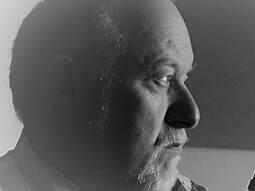 Brindley Hallam Dennis lives on the edge of England within sight of Scotland. He writes short stories. Writing as Mike Smith he has published poems, plays and essays, often on the short story form and on adaptations from texts to film & TV. Many of his stories have been published and performed, sometimes by Liars League in London, Hong Kong, and elsewhere. He holds the degree of M.Litt from Glasgow University. Short Fiction ~ June Hunter Honourable Mention, Strands International Flash Fiction Competition - 17 As she looks at the photograph of herself in her brown bikini on the Durban beach, Marian recalls that holiday. She recalls how the bikini she had knitted fitted perfectly when she had finished its construction, and that photo must have been taken before she ventured into the sea, because there wasn’t much of it covering her when she came back out. That was the holiday when she, accompanied by the boyfriend, had driven the mother, younger brother, and sister on their first trip to the Indian Ocean. It was the year after the father had left and ‘gone off’ with the other woman. A holiday the mother, who had never been able to drive, had begged and pleaded for. “Your sister and brother have never been to the sea,” she said. “Your father never took us anywhere. He’s gone off on a trip with her and her kids, though.” Marian could still see the faces of the brother and sister when she glanced at them in the rear-view mirror as they were nearing the end of their seven hour journey. “First person to see the sea gets a Tickey!” said the boyfriend, sitting next to her. “What’s a Tickey?” said the brother. “It’s an old-fashioned coin,” said the mother. “What can we do with it, then?” said the sister. “Just look out for the sea.” said Marian. And, just as they left the motorway and were heading along Marine Parade to the hotel, the clutch had gone. The mother paid to have it fixed. Underneath the photo of the knitted brown bikini, there’s a photo of the colonial style hotel. Beachfront, but not quite. On the corner furthest from the safe swimming areas. Dated. Cheap. Marian recalls the sullen waiter – Davison, she thinks his name was. He never smiled, and got worse when she said ‘smile Davison, it’s not that bad.’ She could slap her own face for that remark. Davison certainly looked as if he wanted to. At the hotel, the boyfriend got into a sulk when he was expected to share a room with the brother. The mother didn’t like it, but relented when Marian insisted she was going to share with the boyfriend, ‘I’ll sleep in the other bed, I promise’; and the brother moved into the mother’s room. On the next page, there’s a photo of the boyfriend and the brother on the rocks with the sea splashing in the background. The brother’s face is freckled and shiny, his hair standing up in sporadic peaks from the salt and the sand. A small fish dangles from the child’s fishing rod, and Marian notices the smile that never did cover the sadness behind it; and recalls the way he chattered on and on about how the boyfriend had helped him catch the fish. Next to that photo there’s one of the mother in a deck chair. Her rust-coloured, recently permed hair dishevelled, her sunglasses covering her red-rimmed eyes as she stares out to sea. In those days, the mother was never far from a silent weep. On a towel next to her is the sister. She too wears a bikini, although there was very little to put inside it. Her face is sullen. The way it always seemed to be when she was that age. She is brushing sand from her legs and Marian recalls the heat of that sand and how it burned the soles of the feet. She turns back to the photo of herself. She is leaning back on her elbows and grinning at the camera. Her skin has not yet been touched by the sun and glares white against the brown of the bikini. Her body is toned and shapely and she notices how flat her tummy is. No one would ever have guessed there was life growing inside her. She hardly knew herself, before it was gone. ~ 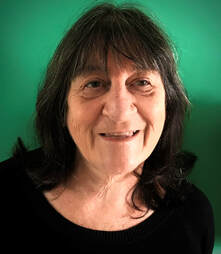 June Hunter lives and writes in Sneem, County Kerry, Ireland. Her work has been featured in various publications including Flash Fiction Magazine, Reflex Fiction, Potato Soup Journal, Blue Nib, Strands Publishers and Bloom. She facilitates the Sneem Writers’ Group, and participates in – Clann na Farraige Writers’ Group, Kenmare; as well as taking part in the monthly Deadlines for Writers online writing challenges. Short Fiction ~ Nathan Alling Long Honourable Mention, Strands International Flash Fiction Competition - 17 I was a child when I first met Angelo Sorento in the village square. I was trying to fish out coins from the fountain, my body resting on the low wall, my hand stretched across the water. “Don’t take away someone’s dream,” he scolded. “Or one day, someone might take away yours.” I didn’t know what he meant, but he had such authority in his voice that I sat up and turned away. It was the only way to keep myself from thinking about the coins. “Good boy,” he said, patting my back. “Each coin,” he added softly, “is a wish a person makes. If you take the coin out of the water, you take the wish away.” “But my father throws a coin in every Sunday, and he says his wishes haven’t come true.” “Perhaps,” Angelo said. “A coin in the fountain won’t make a wish come true.” I nodded, though I was confused. “But,” Angelo said, raising a crooked finger at the sky, “to take the coin is to steal the wish. The wish may not come true, but it’s the wish itself that’s valuable. The fountain holds them for us, like a bank.“ I didn’t know what to think of that, but I liked the idea that my father wasn’t just throwing away our money, but keeping something alive within himself. Angelo then asked me what I wanted money for. “A candy,” I said, though really I didn’t know. “Then you must earn it. Come.” He stood up, motioning me to follow. We walked slowly up the hill to the top of the village. Along the way, he asked what was my name, how far had I ever traveled, what was the largest thing I could think of? When we got to the top, he handed me a few coins. “But I didn’t do anything,” I said. “You walked me home,” he said. “If I had fallen, you would have gotten help. And you told me about yourself, which I might use one day in a story.” At that I smiled. I was always inventing stories, but I never thought I’d be in someone else’s. I took the money then and ran down to the store. That night, I told my parents what Angelo had said about wishes being kept alive. “If the fountain doesn’t make wishes come true, then nothing can,” said my father, a farmer. “What does he know?” “Well, he is a famous author,” my mother said. My father shook his head. “Who needs stories?” But I knew then that I did. So, sometimes after working in the field, I met Angelo at the fountain and talked. Occasionally, he’d pay me to do an errand. But as I grew older and more able, and he grew older and less able, I came to visit him nearly every day, bringing groceries, helping him sort papers, repairing a window or chair. Some nights, we ate together, and Angelo would tell me of the places he had traveled, the men and women he had loved. I always wondered why, despite all his adventures, he returned to our little village. One day, as a teenager, I asked Angelo for one of his novels. I took it home and read it through the night. At first, I was disappointed. I thought it would be about his life, but it was only about a village very much like our own. The main character was a farmer who was too poor to follow the woman he loved. She had left the village for a more worldly life. Every day he dropped a coin in the village fountain, hoping he would strike rich, or she would come back to take him away. Gradually, as I read on, I realized that Angelo was writing the story of my father. “How did you write this?” I asked him the next day. Angelo had always been open with me, but this time, he bowed his head and said nothing. He changed the subject, and soon said he was tired, that he needed to rest. I went on to read all of Angelo’s novels, which were equally beautiful stories about the lives of people in our town. No wonder he returned here; he came to gather our stories and writing them down. I was so moved by his books that one day I did something I’d never done before: I took a coin to the fountain and threw it in, wishing that one day I’d write like Angelo. And now, years later, Angelo is on his death bed, having just told me his secret. “I wrote nothing,” he confessed, less than an hour ago. He handed me a small bottle. “Pour the ink from it and your story will be revealed,” he said. So I took the bottle and poured the ink onto these pages. I wrote none of this. I have not touched a pen. I’ve only sat here and watched these words form, as though the paper had channels guiding the liquid. I don’t understand how this can be, but I am elated. With this bottle, I will be a writer. Still, I wonder how it is done. I go over to Angelo’s bed to get an answer. “Forgive me,” he whispers, and then he is gone. No longer of this world. I pick up the bottle and shake it. There is no more ink, but I feel something shift inside. Through the dark hole I see, resting at the bottom of the bottle, a small coin. I know which coin it is—the one I threw into the fountain years ago. The ink must draw out the wishes from the coins and write them out. And so, it is only by taking my coin from the fountain that Angelo has made my wish come true. ~ Short Fiction ~ Sudha Subramanian Honourable Mention, Strands International Flash Fiction Competition - 17 It was during their third year of marriage that the tailoring tool arrived home. The machine whose spindle could be worked by a square pedal below was black with gold letters on its body. It came hoisted on a rectangular wooden table that stood on small iron wheels. This sewing machine with a spool pin, needle, bobbin and a lever called out to one person with long jet black hair and a sparkling nose stud - Mami. Over the years, Mami has regaled us with the story of - how she came about with the contraption - at least a dozen times. Her eyes sparkled whenever she narrated that tiny moment from her life. Sometimes she added elements to the story, “they held their fingers to their mouth in awe when they saw the shirt I created with the machine”, she would raise her craggy hands to her face gesticulating their reaction. I pictured her working on that stitching device in a dimly lit room with a red floor and a lone window. She looked beautiful in a flowing green saree and clinking glass bangles in my imagination. It is this sewing machine’s trudging wheel that is filling the quiet space with a whirring noise. Mami is pushing the pedal furiously while her wrinkled rough hands guiding the piece of cloth under the needle. It is her second bag in three days and there is no stopping her. I walk up to her from behind, willing for her to stop. No. Nobody needs those bags. But, my brain asks me to let her be. She snips another small piece of fabric and gives it a fine fold and locks it under the clip that keeps the fold in place. The thread mends the loose ends of the cloth giving it shape and size. “Is she mending her heart?”, I can’t dare to face her. I sniff away my grief and walk away to another room. The Sewing Machine was the first gift Mami’s husband had surprised her with. She carried it against her heart and gave it a tidy spot in her home. She dusted it, greased it, and threw long glances at it on busy days. On days when she used her hand to spin the tiny wheel to her right, she smiled with her eyes. “Do you want the loops long or short?”, she asks bending over the table, without lifting her head. The evening sun finds its way through the window. Her hair is loose and wrinkles of her skin hang along the cheeks in soft bags. “What happened to the rest of the cheeks?”, I ask myself. “You don’t like it long do you?”, she looks over her glasses catching my stare. “Erm”, I fumble. My mind draws a blank. “Hand me that green bag that you carry around”, she throws a glance around the room, “I will make it exactly like that”, her eyes latch towards the end of the couch from where my shoulder friend is peeking out. “Sounds good”, I offer without thinking and march up to fetch the tote. She straightens her glasses and gets busy with a tape in hand. She spreads the large piece of fabric and picks up the scissors to cut a strip. I look away to swallow the ball of lump down my throat. I hasten my steps to get out. I want to clear my head. I look at some greens and draw long deep breaths. I practice forcing a smile and quietening my nerves. Only after that do I dare to walk back towards the table. “You could add a stitch or two along the length of the loop”, I add running my hand over her back. She is small and I can feel her bones poking out. She nods without lifting her head and walks to the sewing machine. I bite my lips and shut my eyes tight. The sewing machine is the only present she savors to this day. Unfortunately, Mami’s love affair with the sewing machine has outlived her husband. There are no words, no balms to ease heartbreak. I am unable to find enough love to fill that large void in her heart. “Do you want a zipper for this?”, She calls out. “Yes. I would like that”, the words struggle to find their way out. My eyes trace her frail body slumped in the chair. She bites her lips as she draws the thread through the eye of the needle. Her fingers fumble along the frayed edges of the fabric and press along the zipper to it and work her feet. “Look”, she holds the large tote in her finger and swings it in the air. “It is perfect”, my words are soft and tremble on my lips. I don’t meet her eyes. Her eyes can break me and that can break her. She is trying to keep herself together. Her eyes search the clock, “It is time for my medicine”, she declares. Her eyes have shrunk. I can see more lines than I can count. She adjusts her saree that barely sits on her waist. I put my arm around her and lead her to the table where her medicine kit sits. I rub her shoulders because she is braving a new life on a new path alone. “Would you like a sleeve in the bag?”, she cocks her head. “Why not?”, I chuckle and I stop the tear just in time. Mami staggers towards her spot - her universe in front of the sewing machine. She gives the wheel a push and she pedals away on a new path, towards a stretch alone without the love of her life. ~  Sudha Subramanian is an independent writer of Indian origin living in Dubai. She writes fiction and enjoys a good chai. Her words have found space in Kitaab, Bending Genres, West Trestle Review among others. Connect with her on X @sudhasubraman or on Instagram @sudha_subraman Short Fiction ~ Suzanne Hicks Honourable Mention, Strands International Flash Fiction Competition - 17 “Goddammit!” Dad yelled as he punched the steering wheel. We were about an hour past the crater when he realized we’d missed it. “We’re going back,” he said. “We’ve gone too far. We’ll get home so late,” Mom said. We’d spent the week camping at Great Basin. The trip had been planned in the before time. Dad plotted our route back to Las Vegas, a longer, less direct one, to see the crater. He’d wanted all of us to see it. “I didn’t drive all this fucking way in the middle of nowhere Nevada for nothing!” Dad’s voice boomed as he did a u-turn in the middle of the long stretch of empty highway. I snickered at his cursing like we always used to do. When we reached the turnoff, a small sign marked the entrance to the Lunar Crater. My body shook as we inched along on the bumpy road. Mom let out a yelp when Dad punched the gas and we started to glide over the gravel. “Better,” Dad winked at me in the rearview mirror. At the end of the road, Dad parked the car and we all got out. Mom waved us ahead saying she had to pee. When we reached the edge of the crater, I held tightly to Dad’s hand, uneasy, as I took in its massive size. “Isn’t this amazing? You know astronauts trained here,” he said. “Hello!” he yelled as he stood at the edge of the crater. The sound traveled around and echoed back at us, helloooo! I looked up at Dad and he smiled down at me. “Try it,” he said. “Hi!” I yelled. Hi hi hi hi hi hi hi hi hi hi, the crater said back. I turned to look at the station wagon in the distance. Mom was sunning herself on the hood. I called out to her, but she remained still. “I don’t think she can hear you,” Dad said. “There’s nothing for the sound to bounce off of out here.” I looked around at the desert, empty as far as I could see. I ran back to the car and Mom jumped up from the hood. “You snuck up on me!” she said. I grabbed her arm and pointed to the crater. “Come on, you’ve got to see this!” I stopped when I saw her frozen gaze. I turned to see Dad in the distance. His body bent over the edge, it looked like he was still yelling into the crater. I watched him walk away as he rubbed his hands through his hair, down his face. He ran back to the edge and dropped to his knees and buried his face in his hands. “We can’t hear him because there’s nothing for the sound to bounce off of,” I told Mom, my voice cracking into the void. She nodded, wiping her face and looked at me, her eyes watery. “Let’s go sit in the car, baby. You’re gonna get a sunburn.” Mom sat in the driver's seat and let me sit in the front next to her. She grabbed me a pineapple soda from the cooler. Her eyes remained fixed forward, but I kept my head down and traced the letters on the soda can with my dirty fingernail. When Dad finally came back to the car he waved Mom out of the driver's seat. I got out and ran around to the back as he opened the door and nodded for me to get in, his face bright red and eyes puffy. I paused for a moment and stared into the backseat, empty and vast as the crater. We started driving down the bumpy road and Dad pushed in the tape that was peeking out of the tape deck. I heard crackling sounds, mumbling voices, a quick burst of classical music, and then the strumming of a guitar; the beginning of Dad’s favorite Pink Floyd song. He turned up the volume as the car gained speed and it felt like we were floating. I closed my eyes, inviting sleep to get me home faster. ~ 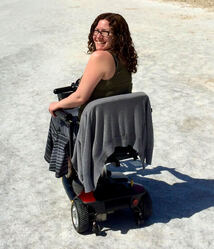 Suzanne Hicks is a disabled writer living with multiple sclerosis. Her stories have appeared in Milk Candy Review, Atlas and Alice, Maudlin House, Roi Fainéant Press, New Flash Fiction Review, and elsewhere. She lives in Las Vegas, Nevada with her husband and their animals. Find her at suzannehickswrites.com and on Twitter @iamsuzannehicks. |
StrandsFiction~Poetry~Translations~Reviews~Interviews~Visual Arts Archives
April 2024
Categories |
 RSS Feed
RSS Feed